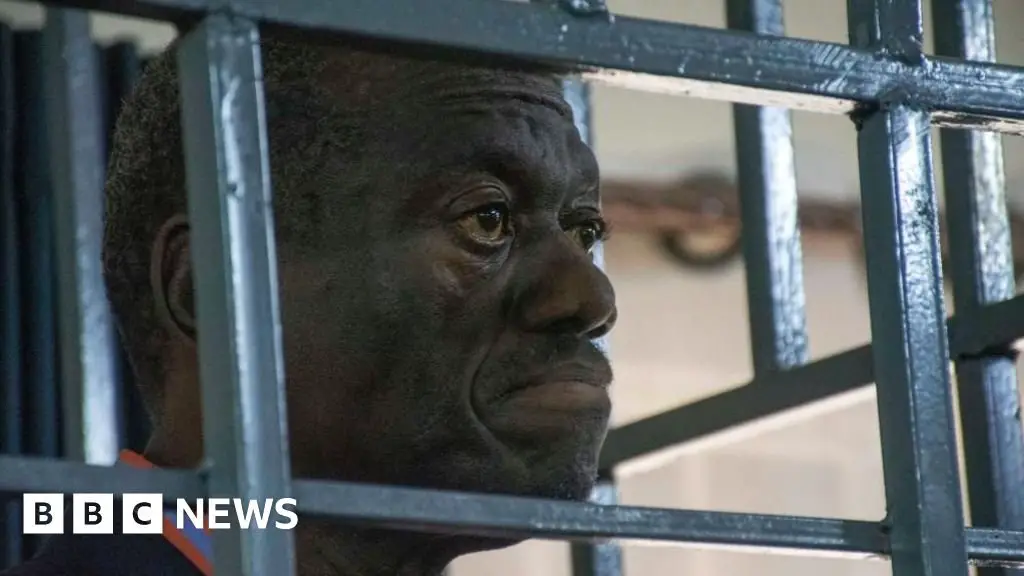The wife of jailed Ugandan opposition politician Kizza Besigye has condemned the ban on prisoners receiving visitors on Christmas Day as “cruel and inhumane”.
Besigye, 68, was charged in a military court with pistol possession and attempting to buy weapons abroad, which he denies. His trial has been postponed until next month.
Prison authorities say that as part of measures to prevent “potential security vulnerabilities”, i.eThe relatives were not allowed access to visitors for seven days, starting on Christmas Eve.
Besigye’s wife Winnie Byanyima, the head of the U.N. agency fighting HIV and AIDS, said she planned to camp outside Luzira prison so she could see her husband and give him food on Christmas Day.
She told the BBC her husband remained “strong and resilient” in a “tiny little room” behind six prison gates, but she was worried he could be “harmed”.
“I don’t leave Besigye’s food at the gate (as instructed). I will go there and see my husband because I don’t trust them for a single day,” Ms Byanyima said.
“Maybe I’ll get a tent and sleep there… if that’s what they want,” she added.
Besigye has contested and lost four presidential elections against President Yoweri Museveni, who has been in power since 1986.
But the experienced opposition politician has been less politically active in recent years and did not run in the 2021 election.
However, Besigye was back in the headlines last month after he was dramatically kidnapped while visiting Kenya and forcibly taken to Uganda.
He was subsequently charged along with an aide, Obeid Lutale. He also denied the allegations.
The military court extended Besigye’s detention until January 7, dashing his family’s hopes that he would spend Christmas at home.
Uganda Prisons Services spokesperson Frank Baine Mayanja told local media that the seven-day ban on visitors was intended to increase security during the holiday and prevent escape attempts.
“Christmas causes excitement and the majority of prisoners don’t want to celebrate Christmas indoors. They need to think about how to do a prison break and go outside,” Mr Mayanja told NTV Uganda.
The prison administration initially announced a ban on prison visits lasting almost a month, but then reduced the ban to seven days.
Ms Byanyima told the BBC she was also concerned about the recent leadership change at Luzira Prison and questioned why a “young and inexperienced” officer had been put in charge.
“This is very suspicious and makes me doubt their intentions,” she said.
“I don’t trust his (Besigye’s) life to those who kidnapped him. I will try to see him as often as possible,” Ms Byanyima added.
Mr Mayanja said the leadership changes were an “administrative matter” and had nothing to do with Besigye.
He added that Ms Byanyima should trust the authorities to take care of her husband because “we have the means and mechanisms to keep him alive”.
“I think she should let us do our work,” Mr. Mayanja said.
This is the second time Besigye, who has clashed with Museveni’s government over the past two decades, will spend the Christmas holiday in prison.
In 2005, he was arrested while returning from a political rally ahead of the 2006 presidential election and charged with treason. The charges were dismissed by the courts.
In another case he was also accused of rape. The charges were later dropped. He said all allegations were part of a political persecution campaign
In the latest case, Besigye objected to being tried in a military court, saying that if he had a case pending against him, he should be tried in a civilian court.
Museveni has defended the use of military courts to try civilians.
He said any crime involving a weapon would be tried in a military court to ensure the stability of the country, as civilian courts were taking too long to process cases.
Hundreds of civilians have been tried in Uganda’s military courts, despite the Constitutional Court ruling against the practice.
Opposition parties have frequently complained about restrictions on political activities and claimed that Museveni fears political competition.
Museveni’s supporters dispute the claim and say he maintained stability during his nearly 40-year rule.





